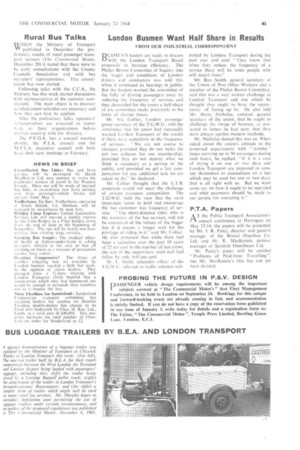London Busmen Want Half Share in Results
Page 43

If you've noticed an error in this article please click here to report it so we can fix it.
FROM OUR INDUSTRIAL CORRESPONDENT
Q liSMEN'S leaders are ready to discuss LI with the London Transport Board proposals to increase efficiency. The Phelps Brown Committee of Inquiry into the wages and conditions of 'London drivers and conductors was told this when it continued its hearings in, public. But the leaders warned the committee of the folly of driving passengers away by reducing the frequency of services and they demanded for the crews inhalf-share of any economics made, preferably in the form of shorter hours.
Mr. Vie Collier, I...ondon passenger group secretary of the T.G.W.U., told the committee that his union had repeatedly warned London Transport of the results if there were reductions in the frequency of services. " We are not averse to changes, provided they do not make the job too arduous for our membership; provided they do not destroy what we think is necessary as a service to the public, and provided we get a fair compensation for any additional task we are asked to do," he declared, Mr. Collier thought that the L.T.B. proposals would not meet the challenge of private transport competition. The T.G.W.U. held the view that the most important factor to hold and encourage the bus customer was frequency of service. " 'ilie short-distance rider, who is the mainstay of the bus services, will not be convinced of the virtues of the bigger bus if it means a longer wait for the privilege of riding in it," said Mr. Collier. He also protested that while there had been a reduction over the past 10 years of 22 per cent in the number of bus crews, the size of the supervisory road staff had fallen by only 6.65 per cent.
Mr. l... Smith, schedules officer of the T.G.W.U. referred to traffic schemes sub mitted by London Transport during the past year and said: " They know that when they reduce the frequency of a service there will be • some people who will desert them."
Mr. Ron Smith, general secretary of the Union of Post Office Workers and a member of the Phelps Brown Committee, said this was a very serious challenge to London Transport and one which he thought they ought to have the opportunity of facing up to. He also told Mr. Harry Nicholas, assistant general secretary of the union, that he ought to challenge the image of busmen, as projected in letters he had seen, that they were always against modern methods.
Mr. Nicholas denied this was so. When asked about the union's attitude to the proposed experiments with " standee buses carrying -up to 90 passengers during rush hours, he replied: " If it is a case of trying it on one or two days and London Transport are prepared to commit themselves to expenditure on a bus which may be used for one or two days. that is all right with us. But we want some say on how it ought to be operated and what payments should be made to our people for operating it."
P.T.A. Papers AT the Public Transport Association's annual conference in Harrogate on May 12-14, the papers will be presented by Mr. I. R. Patey, director and general manager of the Bristol Omnibus Co. Ltd, and Mr. R. MacKenzie, general manager of Scottish Omnibuses Ltd.
Mr. Patcy's paper will be entitled "Problems of Peak-hour Travelling but Mr. MacKenzie's title has not yet been decided.
























































































































